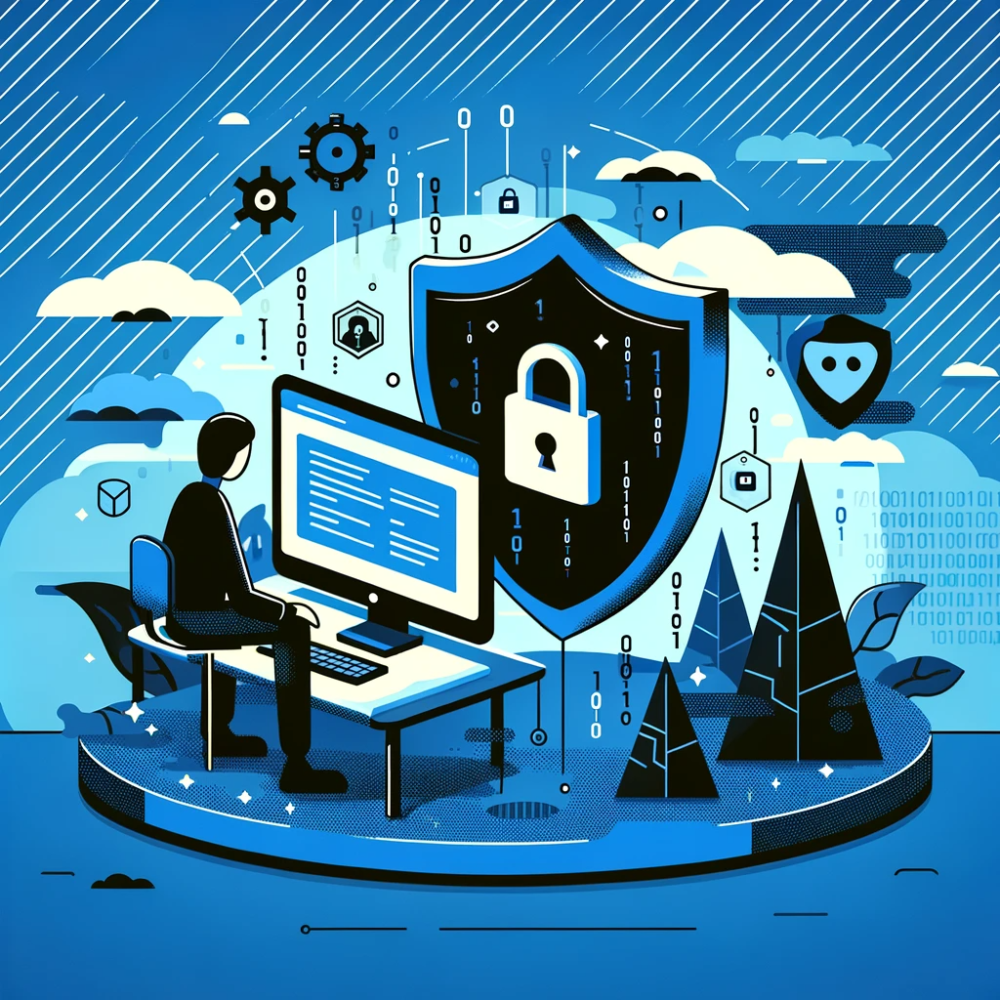The Best Online Security Tips for Small Businesses
In the digital era, where cyber threats loom large, small businesses must embrace effective strategies to safeguard their digital assets. Recognising oneself as a cyber security guru is important to remain competitive among peers in this landscape.
Our short guide checks out fundamental online security tips that small businesses can implement to fortify their defences against common cyber attacks. From installing a firewall to backing up data, we delve into practical steps that can significantly enhance your business’s cyber resilience without incurring substantial costs.
Essential Online Security Practices for Small Businesses
Cyber security may seem expensive and require an entire department, but small businesses can take steps at a minimal cost to defend against common attacks.
It is crucial to educate staff on phishing attacks and other common threats. Strong password policies must also be put in place and data must be backed up on an ongoing basis.
| Security Measure | Description | Benefits |
|---|---|---|
| Install a firewall. | A hardware or software solution that filters incoming data traffic. | Protects against unauthorised access, manages traffic, and flags abnormal activities. |
| Install an antivirus. | Software to guard against malware, including viruses, spyware, and ransomware. | Provides malware protection, safe web browsing, and supports data recovery. |
| Set up two-factor authentication. | An additional verification step in the login process. | Enhances account security and protects against phishing and brute-force attacks. |
| Set up strong passwords. | Enforce unique, complex passwords for all accounts and services. | Reduces the risk of unauthorised access and strengthens the overall security posture. |
| Back up your data. | Regularly save data copies on an independent network. | Ensures data recovery in case of cyberattacks and supports business continuity. |
1. Install a firewall.
Firewalls are integral pieces of hardware or software that manage all incoming data traffic and determine whether it should be blocked or allowed through. It does this by recognising requests by their internet protocol (IP) address, which identifies which computer or server is making the request, thus making it virtually impossible for hackers to gain access by falsifying IP addresses or redirecting traffic.
Professional firewall solutions record all incoming data traffic and learn over time what constitutes normal and abnormal activity, flagging any abnormal activity and alerting you as soon as anything suspicious arises. This allows them to catch any unusual activities immediately and alert you, saving you the hassle of constantly checking network logs yourself while giving your business peace of mind knowing an expert is monitoring all threats against it.
Firewalls block port scans, the initial step hackers use to gain entry and steal information or sell data illegally. E-commerce websites or online stores should particularly take note, as hackers could gain access to product listings as well as customer personal details without proper safeguards in place.
Studies have demonstrated the necessity of training employees on cybersecurity best practices. Employees often contribute to cyberattacks through negligence, making cybersecurity a top priority within your business and ensuring that each staff member understands how to protect your data if a device is lost or stolen. You should have in place policies requiring strong passwords, multi-factor authentication, and encryption so your sensitive data won’t be at risk even in these scenarios.
2. Install an anti-virus
Regardless of whether your business operates exclusively online or locally, you must protect its computers and devices against malware. Malware refers to software that sneaks onto computers without permission and performs unwanted actions for third-party benefit; this can include spyware, viruses, ransomware, and other types of cyber threats.
Many small businesses rely on free antivirus software to secure their networks and devices, but it’s important to be mindful that free tools have evolved in recent years, with some now installing potentially unwanted components such as ads or pushing users towards upgraded paid versions, adding further risks.
SMB owners sometimes feel they are immune from being targets for hackers due to not possessing large security budgets; however, small and medium-sized businesses (SMB) are actually more vulnerable than their larger counterparts due to attackers not discriminating based on size.
Installing world-class antivirus on all of your computers and devices is essential to providing safe web browsing, malware protection, and free phone support services, not to mention helping recover from a data breach or cyber attack.
Backup your data regularly on an independent network to avoid losing vital information in case your systems become compromised, and set up programmes to automatically back up files and data on a weekly basis. This will save time and money should a data loss or cyberattack occur in your company. It’s especially essential if employees work remotely; to protect remote workers, you could require them to use VPNs on public WiFi and enforce policies to separate personal and professional accounts from each other.
3. Set up two-factor authentication.
Unsurprisingly, cyber attacks pose a real danger to small businesses. Cybercriminals tend to target these smaller organisations because they may not invest as heavily in security as larger firms do.
But there are a few simple steps you can take to protect your business from cyberattacks. Make sure both you and your employees use strong passwords with multi-factor authentication; limit access to sensitive data to only those who require it in their jobs; and back up data regularly. These steps should help keep cyberattacks at bay.
Two-factor authentication can also help prevent attacks against your Clover account, such as phishing, social engineering, and password brute-force, by adding another verification step before logging in. Attackers are faced with increased difficulty in taking over compromised accounts that have already been compromised due to this added layer of protection.
Ransomware poses one of the greatest threats to small businesses today. This form of malware encrypts company information before demanding an exorbitant sum in exchange for decrypting it—something that could cripple any organisation within months if caught unprepared. To combat this threat, ensure regular data backups are implemented as well as using the WPA3 encryption protocol for wireless network security.
Finally, make sure you protect physical devices containing sensitive data, such as laptops, tablets, and scanners, which contain sensitive information. It is a smart investment to acquire mobile device management software that will allow you to remotely lock or wipe data from devices lost or stolen by employees. Likewise, encourage employees to utilise VPN connections when connecting to public WiFi networks; never mix personal and business accounts on one device.
4. Set up strong passwords.
Passwords are your business’s digital keys to data and finances. Unfortunately, cybercriminals use brute-force attacks or reuse old passwords to gain entry and steal valuable information from systems within a business. You can protect your organisation by creating strong password policies for employees.
Make sure all of your employees use unique passwords for every online account and service they use to reduce the chance of one password being found and used to unlock everything. Furthermore, avoid using personal details like names or birthdates in their passwords, rather than trying random words or numbers not found in dictionaries as your passwords.
Encourage employees to use password managers when creating and storing their passwords to make remembering them easier without writing them down or saving them in unprotected files. This will enable employees to easily create unique passwords without writing them down or saving them in unsecure folders.
Finally, it is essential that employees regularly change their passwords. This will reduce the chances of hackers exploiting weak passwords to gain entry to sensitive company data.
As a small business owner, you want your employees to remain safe from cyberattacks. To do so effectively, require them to implement basic security measures such as protecting passwords with strong policies and backing up data regularly. Furthermore, provide cybersecurity training so employees are aware of what threats exist and how best to defend against them.
5. Back up your data.
Establishing and monitoring backup systems is one of the most essential cyber security guru tips for small businesses to implement, as this ensures they will be able to recover data after any catastrophic event. Many organisations opt to back up user accounts like documents, pictures, desktop folders, and downloads in order to safeguard all the important data used every day. Alternatively, some opt for real-time protection that automatically saves their information whenever changes take place without needing human intervention—another great cyber security measure!
At your business, protecting hardware holding sensitive information is just as essential. This includes laptops, tablets, and mobile phones used by employees or yourself for online business functions like email and internet browsing. Make sure all such devices have password-protected locks that only authorised users have access to; consider tracking devices in case they go missing as an added precaution.
Though you may do your best to prevent cyber threats and hacking, it is essential to recognise that these attacks do not discriminate according to company size. Even small businesses that are unprepared may suffer the effects of data breach attacks if there is no backup system in place.
When it comes to implementing cybersecurity systems in your small business, it is vitally important that you partner with an IT support service that understands and can assist with implementation. Experts in this field will help you navigate threats within your budget while finding viable solutions that address them.
Metaverse Cyber Security 101: Phishing In The Metaverse
The metaverse: a dazzling wonderland of digital possibilities, where virtual reality merges with our everyday lives. We work and game in the metaverse, and socialise in vibrant landscapes limited only by our imaginations. With every new technology sold on the market there emerges certain challenges such cybersecurity threats in the metaverse.
While still in its infancy, the metaverse holds immense potential for malicious actors. Imagine your carefully crafted avatar, your digital identity, hijacked. Your virtual bank account drained, your precious digital land stolen, and your reputation smeared across the metaverse. Not exactly the immersive experience we signed up for, right?
The stakes are real. A 2023 report by cybersecurity firm McAfee estimates that cybercrime in the metaverse could cost businesses up to $1 trillion by 2025. And it’s not just corporations at risk. Individual users face dangers like:
- Phishing scams: Deceptive websites and avatars could trick you into revealing personal information or financial details.
- Malicious software: Infected virtual items or environments could compromise your hardware and data.
- Identity theft: Your avatar’s unique characteristics could be stolen and used to impersonate you in the metaverse.
- Harassment and griefing: With anonymity comes the potential for online abuse and unwanted interactions.
So, how do we navigate this brave new digital frontier safely? Here are some essential tips:
- Be wary of strangers: Just like in the real world, don’t trust everyone you meet in the metaverse. Be cautious about sharing personal information and engaging in financial transactions with unfamiliar avatars.
- Use strong passwords and authentication: Secure your metaverse accounts with complex passwords and enable two-factor authentication for an extra layer of protection.
- Only download trusted software and items: Stick to reputable metaverse platforms and marketplaces, and be wary of downloading unsolicited virtual items or software.
- Report suspicious activity: If you encounter something that seems off, don’t hesitate to report it to the platform moderators or authorities.
Remember, cybersecurity is a shared responsibility. By working together, we can create a safer and more secure metaverse for everyone.
Stay tuned for upcoming posts where we’ll dive deeper into specific metaverse security threats and solutions!
Don’t forget to share your thoughts and experiences in the comments below. Let’s build a safer metaverse together!






